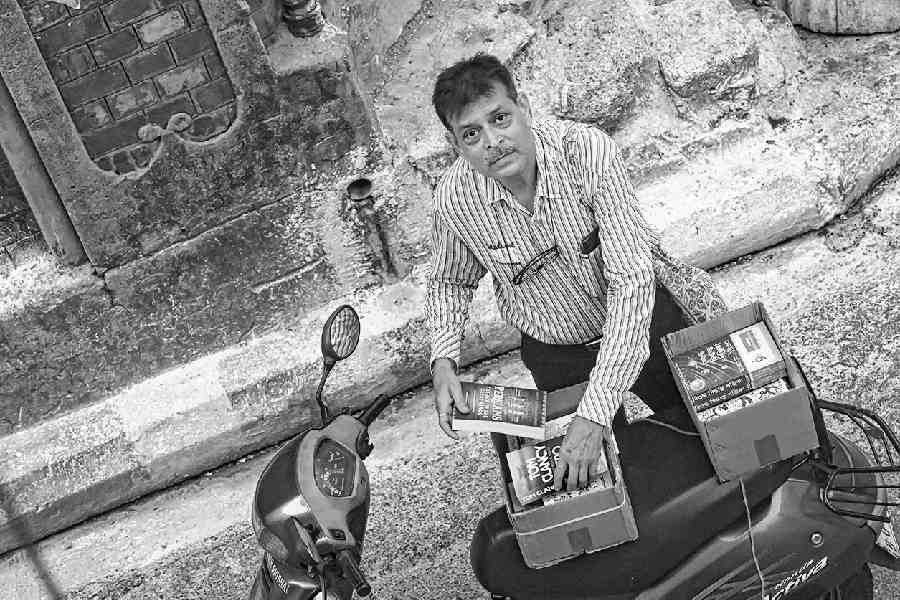This story is about Tarunda but it begins long before him. Sometime towards the end of the 19th century, the Kesarvanis moved from Kashmir to Bihar. That would be the great-grandfather of Tarunda. After working for some years in Purnea, he moved to Berhampore in Bengal and thereafter to Calcutta. In between, the Kesarwanis took up the surname Shaw, though no one can say why anymore.
To those who don’t know Tarunda or Tarun Kumar Shaw, he is a lean man with a comet’s velocity, cloth bag slung from one shoulder and a carton tucked under the arm, head thrust forward forever powering through steel, glass and wood of offices, residences, clubs and schools with an expressionless face. At 58 he criss-crosses the chaotic city on his scooter. Rare is the person who has seen him sitting, and even when he is standing his entire bearing is animated, as if he cannot wait to open his own box of treats and surprise his customers.
Tarunda’s father Gopal Lal Shaw got a job as a peon in a bookshop called Dey Brothers in the now long-closed “book range” of New Market. Gopal Lal didn’t go to college but he learnt the nuances of bookselling; customers started calling him Dey. And when the real Deys started to wrap up business, he struck out on his own. Says Tarunda, “In the 1970s, my father was the only one home-delivering foreign magazines and foreign newspapers.”
Gopal Lal never owned a shop space, and with so many books at home, a young Tarun caught the book bug. He was still in college when he bought a second-hand bicycle and started helping his father.
In 1989, Gopal Lal was run over while delivering books. By then Tarunda and his brother Uttam Kumar had taken over the business. Tarunda was, as they say, a carbon copy of his old man, and some of the older clients continue to address him as Gopal to this day.
Tarunda expanded the business. The stories pour out. Of corporate bigwig Bipradas Chattopadhyay who was mountain-smitten, bought books on mountains but had never seen one. Kunal Dey of Sinthi, a university professor, who bought books on wildlife. Artist Prabir Sen who has “everything possible” on Halley’s Comet. More stories. The artist who bought all that is in print on Marilyn Monroe; the elderly industrialist who likes to read his Jeffrey Archers no sooner than they are written. Tarunda talks about the 1980s, when clerks in private offices read Chekhov, Lenin, Marx.
In the “old days” everyone in the book business knew books, loved books. “A shopkeeper selling le Carre knew that the writer himself had been a spy. Trade basics.” Tarunda learnt a lot about books from either side of the book chain. If there was someone like a Babuda from Dey’s Publishing who would enlighten enthusiasts like him about Bengali books, there was someone like Rituparno Ghosh whom he heard holding forth on Draupadi. “If he asked for four titles and I got only four for him, he would be furious,” says Tarunda. From his framed portrait in the Shaws’ puja room, Gopal Lal watched the business change.
At all times Tarunda carries a thick notebook made to order from the neighbourhood binders. Every page has a name on top and below book titles and prices. There are squiggles, slashes and ticks, which only he can decipher; an accountant’s nightmare though the system works fine for him.
Week after week, Tarunda appears at the doors of booklovers, wordlessly lays out his carefully curated wares for just enough time to tempt and then packs them wordlessly and sets off again. He recounts how Sunil Gangopadhyay would say in his imitable style, “Ei duto nilam”, and get back to his business. Often, after Tarunda has left, a client will discover a shy volume. He says, “Sometimes a person will touch a book, smell it, then put it down and look away.” That volume is for them. But not everyone is thrilled. A client’s wife has warned: “If you get any more books, I shall cook and feed him only books.”
No one who has ever bought a book from Tarunda can swear on his Galileo’s Daughter or The Encyclopaedia of Religion and say he hustles his clients for payments. In those days when companies disbursed salaries in cash, Tarunda knew the designated salary day of each place; he would turn up that day, that’s all. “When I returned home my pockets would be swollen,” he recalls. That said, Tarunda’s standard line is, “If only the rich would buy books, I too would be rich. But I sell books to those who love them.” As he says it, the middle-class client may not be able to pay for a book in one go but rarely defaults on payments.
Tarunda says he sees a book and a client’s face flashes through his mind. By way of wrapping up this interview, he agrees to play a game of match-the-following. He fishes out a book and immediately calls out the name of a customer.
The game begins. The book on 18th century English painter JohnConstable is matched with the just retired cop Debasish Boral. Hannah Dawson’s book of feminist writing isfor retired professor Dipesh Lahiri. A History of Masculinity by Ivan Jablonka is for retired banker Sanjoy Mitra…
That’s Tarunda for you, the tireless evergreen bookman.










